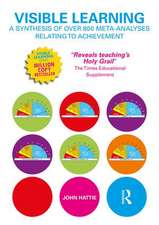Readings in Educational Psychology: Routledge Library Editions: Education
Autor Edgar Stonesen Limba Engleză Hardback – 8 dec 2011
Din seria Routledge Library Editions: Education
-
 Preț: 379.49 lei
Preț: 379.49 lei -
 Preț: 400.94 lei
Preț: 400.94 lei -
 Preț: 377.16 lei
Preț: 377.16 lei -
 Preț: 379.32 lei
Preț: 379.32 lei -
 Preț: 401.34 lei
Preț: 401.34 lei - 8%
 Preț: 382.25 lei
Preț: 382.25 lei - 18%
 Preț: 1332.87 lei
Preț: 1332.87 lei - 34%
 Preț: 819.90 lei
Preț: 819.90 lei - 26%
 Preț: 247.40 lei
Preț: 247.40 lei - 36%
 Preț: 819.90 lei
Preț: 819.90 lei - 36%
 Preț: 819.90 lei
Preț: 819.90 lei - 36%
 Preț: 819.90 lei
Preț: 819.90 lei - 36%
 Preț: 991.00 lei
Preț: 991.00 lei - 34%
 Preț: 822.76 lei
Preț: 822.76 lei - 36%
 Preț: 821.53 lei
Preț: 821.53 lei - 29%
 Preț: 259.98 lei
Preț: 259.98 lei - 34%
 Preț: 764.20 lei
Preț: 764.20 lei - 36%
 Preț: 819.90 lei
Preț: 819.90 lei - 36%
 Preț: 761.85 lei
Preț: 761.85 lei - 36%
 Preț: 986.91 lei
Preț: 986.91 lei - 55%
 Preț: 541.50 lei
Preț: 541.50 lei - 36%
 Preț: 762.01 lei
Preț: 762.01 lei - 27%
 Preț: 261.37 lei
Preț: 261.37 lei - 36%
 Preț: 764.20 lei
Preț: 764.20 lei - 36%
 Preț: 762.97 lei
Preț: 762.97 lei - 36%
 Preț: 819.90 lei
Preț: 819.90 lei - 36%
 Preț: 986.91 lei
Preț: 986.91 lei - 36%
 Preț: 821.53 lei
Preț: 821.53 lei - 36%
 Preț: 819.90 lei
Preț: 819.90 lei - 36%
 Preț: 819.90 lei
Preț: 819.90 lei - 36%
 Preț: 821.13 lei
Preț: 821.13 lei - 34%
 Preț: 2100.27 lei
Preț: 2100.27 lei - 36%
 Preț: 819.90 lei
Preț: 819.90 lei - 36%
 Preț: 819.90 lei
Preț: 819.90 lei - 36%
 Preț: 764.20 lei
Preț: 764.20 lei - 36%
 Preț: 819.90 lei
Preț: 819.90 lei - 36%
 Preț: 986.91 lei
Preț: 986.91 lei - 36%
 Preț: 764.20 lei
Preț: 764.20 lei - 36%
 Preț: 819.90 lei
Preț: 819.90 lei - 34%
 Preț: 4048.76 lei
Preț: 4048.76 lei - 36%
 Preț: 736.38 lei
Preț: 736.38 lei - 36%
 Preț: 819.90 lei
Preț: 819.90 lei - 36%
 Preț: 821.53 lei
Preț: 821.53 lei - 36%
 Preț: 819.90 lei
Preț: 819.90 lei - 34%
 Preț: 819.90 lei
Preț: 819.90 lei - 36%
 Preț: 819.90 lei
Preț: 819.90 lei - 36%
 Preț: 819.90 lei
Preț: 819.90 lei - 36%
 Preț: 819.90 lei
Preț: 819.90 lei
Preț: 1051.95 lei
Preț vechi: 1626.43 lei
-35% Nou
Puncte Express: 1578
Preț estimativ în valută:
201.35€ • 218.79$ • 169.25£
201.35€ • 218.79$ • 169.25£
Carte tipărită la comandă
Livrare economică 21 aprilie-05 mai
Preluare comenzi: 021 569.72.76
Specificații
ISBN-13: 9780415678452
ISBN-10: 0415678455
Pagini: 490
Dimensiuni: 156 x 234 mm
Greutate: 0.98 kg
Ediția:1
Editura: Taylor & Francis
Colecția Routledge
Seria Routledge Library Editions: Education
Locul publicării:Oxford, United Kingdom
ISBN-10: 0415678455
Pagini: 490
Dimensiuni: 156 x 234 mm
Greutate: 0.98 kg
Ediția:1
Editura: Taylor & Francis
Colecția Routledge
Seria Routledge Library Editions: Education
Locul publicării:Oxford, United Kingdom
Public țintă
General, Postgraduate, Professional, and UndergraduateCuprins
Preface. 1 Overview 2 Thinking, Language and Learning 1 Learning to Think H F Harlow 2 The Development of Children’s Speech and Thought A A Liublinskaya 3 Words, Meanings and Concepts (1) J B Carroll 4 Language and Concepts E Sapir 5 Language and Mental Development A R Luria and F Ia Yudovich 6 Thought and Word L S Vigotsky 7 The Genetic Approach to the Psychology of Thought 8 The Learning of Principles R M Gagné 3 Learning Theory and Teaching Practice 1 A Perspective On the Relationship Between Learning Theory and Educational Practices E R Hilgard 2 Psychological conceptions of Teaching N L Gage 3 Some Theorems on Instruction J S Bruner 4 methods of Scientific Research in the Psychology of Instruction Z I Kalmykova 5 An Experimental Study in the Formation of Mental Actions P Ia Gal’perin 6 The Stage theory of the Formation of Mental Operations N Talyzina 7 Learning By Discovery: An Interpretation of Recent Research B Y Kersh and M C Wittrock 8 Words, Meanings and Concepts (2) J B Carroll 9 the Psychology of Learning D N Bogoiavlenski and N A Menchinsakaia 10 Reception Learning and the Rote-Meaningful Dimension D P Ausubel 11 Interaction Analysis As a Feedback System in Teacher Preparation E J Amidon and E Powell 4 Some Aspects of Subject Teaching 1 Educational Research and the Learning of Mathematics R M Beard 2 Concept Formation and its Significance in Mathematics Teaching and Syllabus Reform R Skemp 3 The Mastery of Scientific Concepts in School R G Natadze 4 The Mastery of Children of Some Concepts in Physics E A Fleshner 5 Some Problems in the Psychology of History Teaching: Historical Ideas and Concepts E A Peel 6 Reading Skills Re-Examined J Merritt 7 Learning to Think About Reading J F Reid 8 Musical Communication J B Brocklehurst 5 Progamming Teaching 1 The Science of Learning and the Art of Teaching B F Skinner 2 Learning Theory and Programmed Instruction A N Leont’ev and P Ia Gal’perin 3 Teaching Machines in Programmed Instruction M J Tobin 4 The Feasibility of Programmed Television Instruction S K Gryde 5 Strategy and Tactics in Programmed Instruction E Stones 6 C A I: Some Problems and Perspectives L Stolurow 7 An Instructional Systems Approach to Course Development M R Eraut 6 Failure in Learning 1 Handicaps in Learning A Cashdan 2 Perceptual-Motor Difficulties K Wedell 3 Memory Span and Language Proficiency N C Graham 4 Levels of Expectancy and the Self-Fulfilling Prophecy R Rosenthal and L Jacobson 7 The Evaluation of Learning 1 The Validity of Examinations at 16-plus I M Connaughton 2 Reliability and the GCE Examination A S Willmott 3 The Measurement of Learning Outcomes: Some Questions R Glaser 4 The Evaluation of Learning E Stones Name Index. Subject Index.
Recenzii
‘Here at last, is the book we have been waiting for, an introduction to educational psychology which links theory to practice...This is a book for teachers as well as students, well written and well organized...Complex matters are set out clearly, using examples effectively.’ -- Forum
‘Mr Stones goes out of his way to bring out the relevance of the experimental study of learning in the practice of teaching.’ -- Educational Review
‘Mr Stones goes out of his way to bring out the relevance of the experimental study of learning in the practice of teaching.’ -- Educational Review
Descriere
The papers in this volume relate to the nature and conditions of classroom learning, with particular emphasis on the cognitive aspects. They are concerned with the question of concept formation and stress the importance of the teacher’s function in ensuring that the child really has assimilated the ideas and not merely the words for the concepts. The role of language is fundamental to this theme, and the interaction of language, thinking and learning is dealt with in the first section of the book. This section also provides a context within which subsequent discussions of classroom learning problems can be viewed. Some problems concerning the elaboration of a general theory of teaching are then examined with particular reference to possible methods of bridging the gap between research and implementation.










